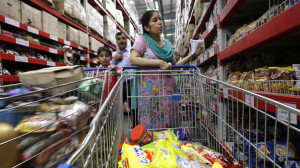
Indian-born, Anju grew up in Hong Kong and has also lived in Australia, Singapore, India and USA. Her fiction explores how cultures and traditions affect people values, beliefs and behavior patterns in today’s shrinking smart-world. She hopes to bridge cultures and break barriers one book at a time. ‘Duty and Desire’, the debut in Anju’s ‘Winds of Fire’ series, is available worldwide in hardcopy and on Kindle, Nook, Kobo and Apple.
I read an article in the Wall Street Journal last week and that really got me thinking. Walmart has been having a ball of a time now that it’s gained entry in the Indian market.
For many US-returns they get a slice-of-US-life back on Indian soil. For locals, who love the idea of shopping in supermarkets and retail chain stores, it’s the promise for a bigger and better shopping experience. And for Walmart it’s entry to a market, where mom and pop shops have been running the gamut for generations, is a break-through.
With an exploding population of 1.2 billion – people in India also have more money in their pockets, a taste for the better things in life and a desire to a more western approach, Walmart (like McDonalds several years ago) took advantage of government policies, allowing foreign companies to invest in the country’s multibrand retail sector, and will open shop.
POP! The champagne’s running!
Walmart promised a great shopping experience along with more jobs, securing better income for farmers and reduced  agricultural waste as side bonuses to its launch. Plus the added benefit of new technology, new approaches to marketing agricultural produce… and on and on…
agricultural waste as side bonuses to its launch. Plus the added benefit of new technology, new approaches to marketing agricultural produce… and on and on…
But after the champagne and party was over Walmart began to realize things weren’t quite going as planned – even though they planned with a local India company to paint the big picture and make it happen.
For example, Walmart’s fleet of tractor trailers can’t cover the distances in India, within the time frame it can in the US. The infrastructure of both countries cannot be compared. Efficiency in one doesn’t mean the same for the other. How about the lifestyle some locals are already used to? Like familiarity with the smaller shops and a preference to buy from them? Just because you’re bigger and have a wider presence doesn’t mean you’re more desirable…
And what about the fear of being over ruled? A country that recently gained its independence from the British in 1947 raises this question: “In a heated debate last week, politicians likened modern-multinationals to British colonists who first set up shop in India as traders.” (www.smartplanet.com) Let’s face it, both India and USA were have had their share of the British rule and serving as a British colony. And no one’s going back!
But there have been a few blame-games in the works…
McDonalds in India, recently wrestled accusations that its potatoes were being imported from USA instead of using locally grown potatoes for the Indian market. Then there were the intense clarifications (before its launch) that beef will not be used in its burgers (considering the cow is holy in India – No… not ‘Holy Cow!’ but really… considered religious) and of course the guaranteed use of vegetable oil in all McDonalds’ products.
And I’m sure Walmart will continue to have its own share.
But there are some things we all need to understand.
India and USA were both children of the British rule. Both fought for independence and earned their right to freedom – the hard way.
No matter how big. No matter how broad. No matter how wealthy. There are some barriers that you simply cannot break. These barriers can be tided over with respect, understanding and a rationale empathy that what works here doesn’t work there. Why?
Because people here are simply not the same as people there. You can only break barriers when you bridge cultures.
Visit Anju at: http://www.anjugattani.com , Facebook: Anju Gattani Author, Twitter: @Anju_Gattani and Goodreads. 